Information Education and Communication (IEC) is the key to behavior change which lies at the foundation of making a success of Swachh Bharat Mission.
IMC adopted and undertook a range of IEC activities ranging from traditional to audiovisual to print and electronic media to social/digital media to change the behavior of different segments of the population and those who associated with different sectors. A brief description of some of the novel IEC measures taken up by IMC for behavioral change in Indore is given below.
Cultural events such as the Ganesh festival, Dusshera, Gandhi Jayanti were utilized as events to spread the swachhata message. An important aspect with regard to IEC was its incorporation into monitoring activities. These activities verified (monitored) the current status of service delivery.
The verification process took place through different means.
Following Process was Inculcated:
a) 311 app for service delivery,
b) surprise checks through online site visits,
c) monitoring staff attendance through biometrics. 311 app has come out as an important means for registering complaints emerging from different residential areas.
The complaints are addressed in quick turnaround time. The status of complaints registered and addressed is monitored by the Municipal Commissioner.
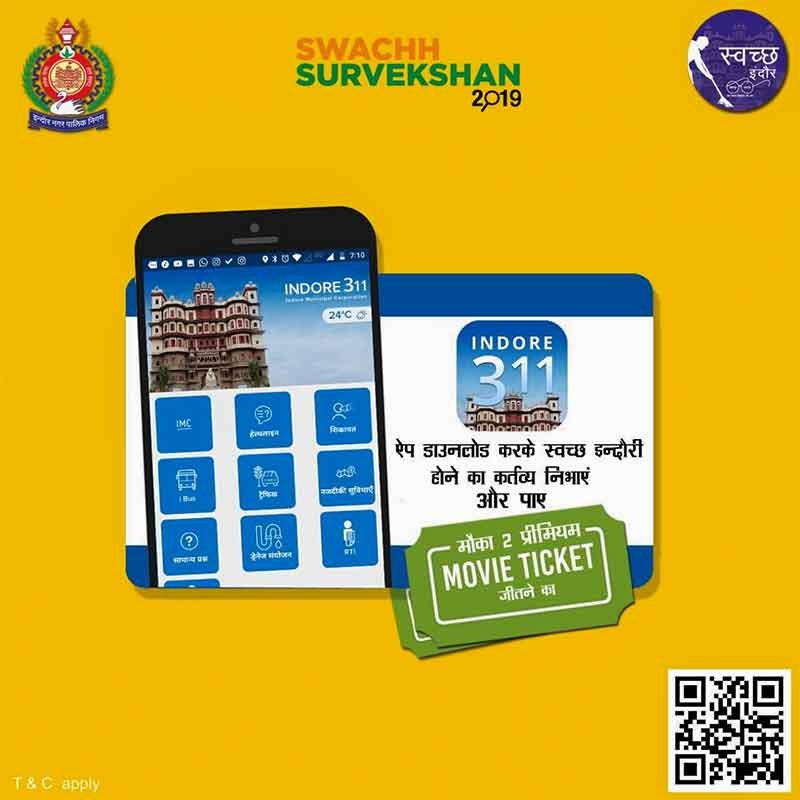
IEC was aimed at educating citizens on whom to reach out for availing services as well as articulate issues. The success which Swachh Indore envisioned and even managed to achieve was depended on the nature of collaboration between service providers (community associations, citizen volunteers, NGOs) and IMC official machinery (CSI, Zonal officers, and core IMC officials). While certain IEC media, such as nukkad nataks, rallies, swachhata samitis connected citizens with service providers – on the other hand, technologies such as 311 App and walkie- talkies helped in directly connecting with the IMC official machinery.
Therefore, IEC was designed in a manner to build the capability of the citizen to reach out to service providers and official IMC machinery. For example, an aspect of solid waste management was recycling the waste to prepare compost. Linkages were created with the Department of Chemicals and Fertilizers for the preparation of compost. Linkages were strengthened with the Department of Agriculture for ensuring the supply of the compost to the farmers in neighboring locations.
Waste Processing and Final Disposal
Prior to the upgradation was undertaken to Devguradia trenching ground, it was nothing but simply a dumping ground on the outskirts of Indore. It used to emit foul smell and citizens living around the place made complaints to shift it to some other location. The location also received constant fires leading to further pollution in the city. Upgradation work has been carried out in the area:
- Upgradation of processing plants at the Devguradia disposal site has been done.
- New weighbridge, entry gate, green belt, service center, boundary wall and construction of internal roads at waste disposal site has been done.
- CCTV cameras have been installed for surveillance at the waste disposal site.
Waste collection areas have been divided into sectors for the efficient working of the cleaning staff.
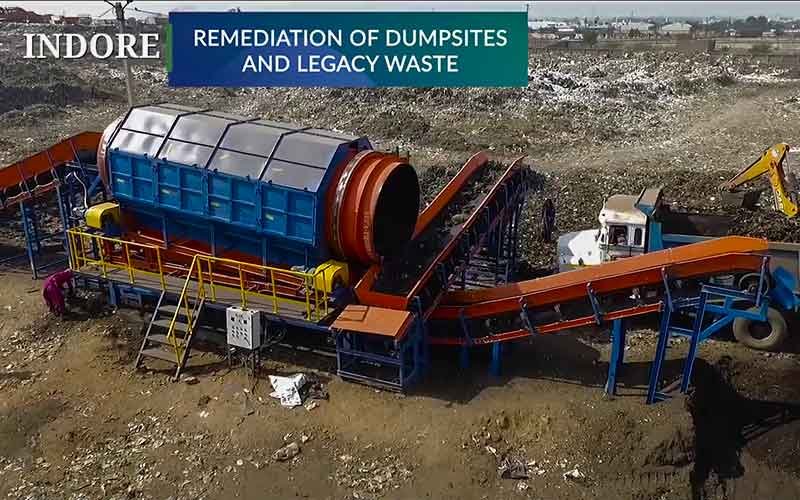
Upgradation of Trenching Ground(s)
- Two engineered landfills of 6.25 acres each have been constructed and are used as and when required.
- Bioremediation of 200,000 MT waste dump on 5-acre land has been achieved.
- Two weighbridges have been constructed.
- Service station has been established where 6 vehicles can be serviced at a time.
- Plastic collection waste center has been established
- Fire hydrant system has been established for fire fighting
- For small repairing in vehicles, workshop has been established
- Cement concrete road with drains and electrification with lighting has been done for better working of waste vehicles
- Green belt has been developed inside and outside the disposal site
- Boundary wall has been constructed around the waste disposal site
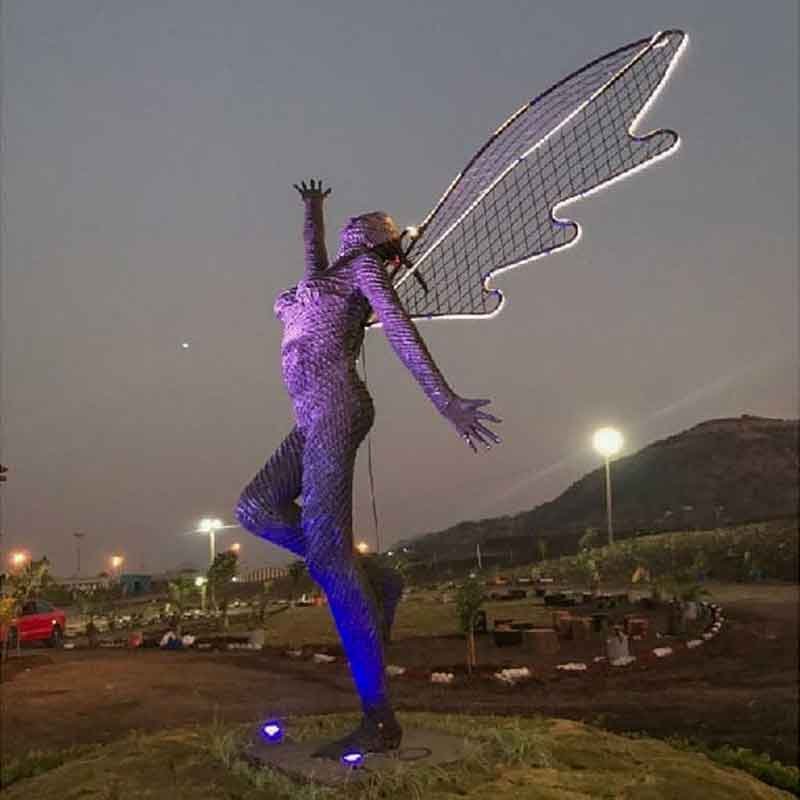
Establishment of Small Composting Units for Marriage Gardens, Schools, Hotels and 3 Vegetable Markets
The small composting units have been established to improve solid waste management at the source itself: Khajrana Ganesh and Ranjeet Hanuman temple, school, marriage garden and hotel, and vegetable markets at Rajkumar and Nandlalpura, municipal gardens and parks, Zoo.
Biomethanation Plant for Wholesale Vegetable and Fruit Market
Currently, all the fruit and vegetable waste generated at Choithram Mandi is being collected and processed in the Bio CNG plant. Near to 800 kg of purified and compressed Bio CNG having 95% pure Methane gas is generated on a daily basis.
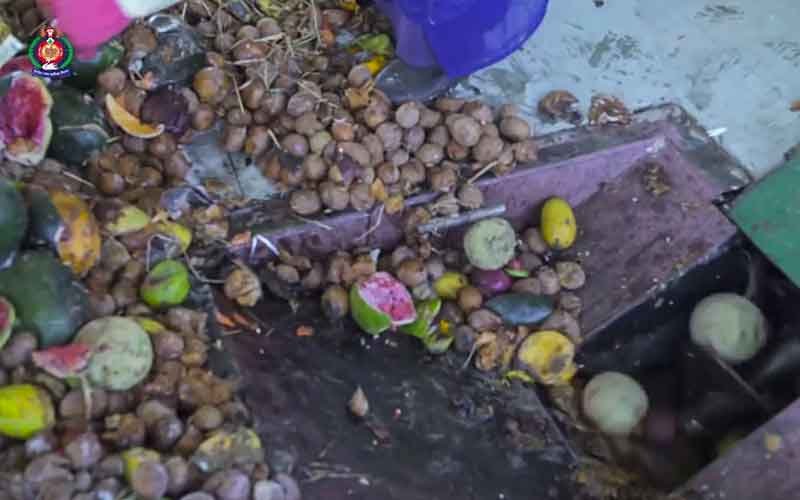
Plastic Waste Collection Centre
With IMC taking over the waste collection, rag pickers were rendered jobless. The rag pickers have been re-oriented and are now working at a plastic waste collection center with the help of NGO Sarthak and Basix.
Plastic waste collected at plastic waste collection center is disposed of in two manners: (i) Sold to cement plant at Neemuch and
(ii) Sold and used by M.P. Rural Road Development Board for construction of roads. Ten roads have been constructed within Municipal Corporation by using plastic waste.
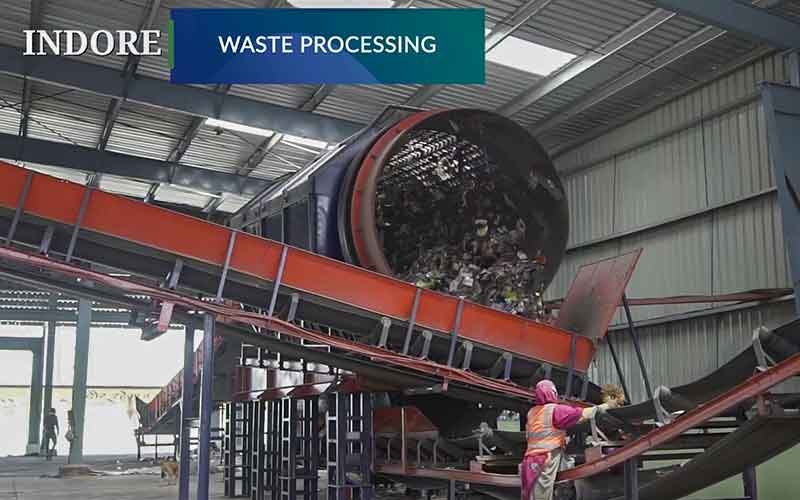
MECHANISED ROAD CLEANING
In order to check the quality of sanitation and solid waste management in the city, one of the most important parameters used by the Pollution Control Board is the Respirable Suspended Particulate Matter initially, the RSPM was very high in Indore at the level of 140-145 Microgram per CuM. One of the reasons for this high RSPM was dusty roads. Cleaning the roads manually was a difficult task in the main areas which are busy during the day. Night road sweeping was a critical aspect of road cleanliness.
A contract was issued to outsource this activity in Sept. 2016 after following due process of tendering. The contract ensured that high-end machines were to be used for cleaning.
The IMC was able to get its service at a competitive price of Rs.0.7 million per month. They make the use of Elgin Sweeper Company’s (USA) machines 12 which are highly reputed in terms of quality standards. Their machines have sturdy vacuum suction and very strong brushes. From October 2016 these machines were extensively used in the city and around 2400 dumpers of waste were taken out.
By December 2016 the dust in the city was substantially reduced. This international waste management company had a very good experience in litter picking. When they performed the task of litter picking they did it so efficiently that it motivated the cleaning team of the IMC to do a better job.
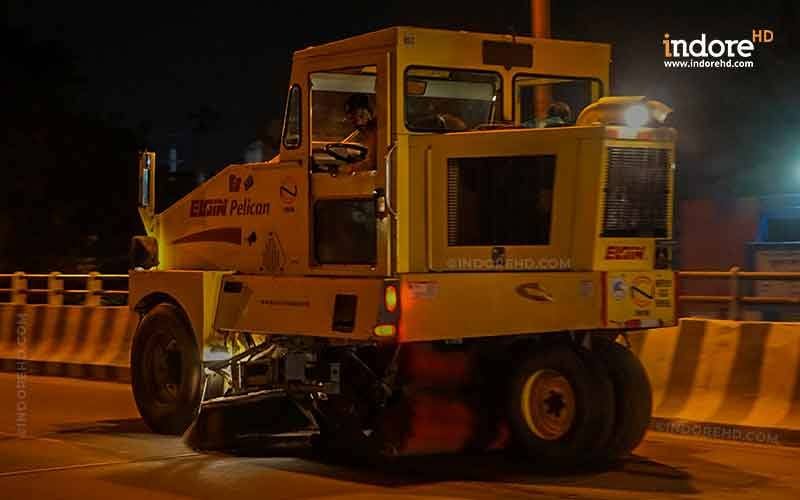
Gap Assessment
To overcome all the deficiencies of the present system and to establish a solid waste management system of Indore city as per and Solid Waste Management Rules 2016 following actions are required.
- 100% door to door collection and storage of waste.
- To make city bin free so as no storage of waste can be done along roads.
- Fixing of litter bins in all commercial areas.
- Establishment of modern transfer stations at strategic locations.
- Establishment of waste to energy plants.
With the assistance of IEC, the NGOs not only communicated how waste can be recycled but also how to prepare compost and in turn, can be beneficial to other stakeholders. Hence a cross partnership was established where the waste turned into a valuable product serving the needs of others. Alignment was thus built between different stakeholders –the waste generators, waste collectors, waste processors and users of value-added products of recycled waste. The IEC innovation ensured that these are communicated to the citizens as to how the current set of Swachh activities align with policies, departmental efforts and has beneficial effects on other stakeholders.
(With inputs from the official IMC website)
Also, read about another IMC’s game-changing move Here


